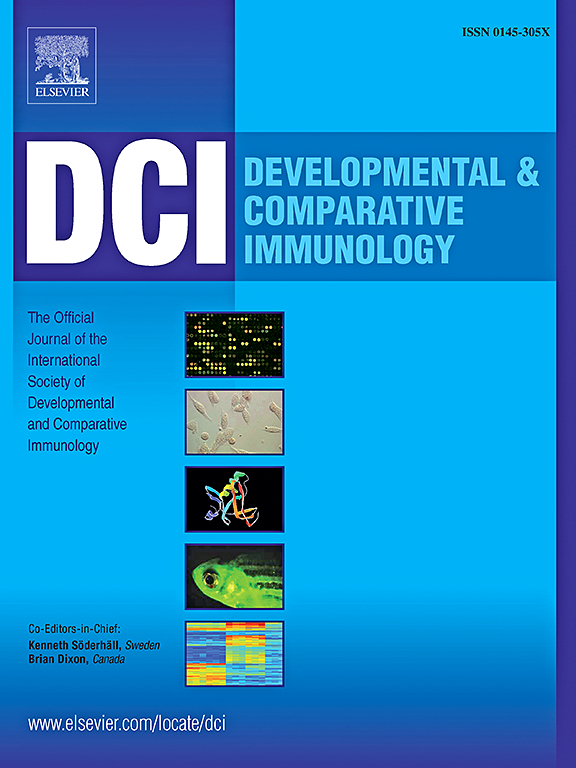Molecular characterization of two newly recognized lysozymes of the protist Dictyostelium discoideum
IF 2.7
3区 农林科学
Q1 FISHERIES
引用次数: 0
Abstract
The model organism Dictyostelium discoideum functions as a social amoeba that can aggregate, eventually forming a fruiting body composed of a fixed number of cells. This behavior requires a soluble counting factor (CF) complex, which plays a key role in group size determination and has been identified earlier. The CF complex comprises among others the proteins CF45-1 and CF50. Although both proteins share sequence similarities with characterized Chalaropsis- and Entamoeba-type lysozymes, enzymatic activity has not been confirmed until now. CF lysozymes have unusual sequence characteristics consisting of an N-terminal glycoside hydrolase family 25 (GH25) domain and a C-terminal low-complexity region rich in serine, glycine, alanine, and asparagine residues.
In this study, we present the production and purification of soluble recombinant CF lysozymes and demonstrate notable enzymatic activity, in particular for CF50. Additionally, a truncated version of CF50, which lacks the C-terminal low-complexity region, displayed significantly enhanced lysozyme activity compared to the entire enzyme. Both CF lysozymes exerted strict pH dependence with maximal activity observed under acidic conditions at pH 3.0–3.5. Moreover, the enzymes displayed highest activity at low ionic strengths and were stable at relatively low temperatures only. Using structural modeling and site-directed mutagenesis, we identified a glutamic acid residue essential for catalysis. Conclusively, we propose a neighboring group catalytic mechanism analogous to that of other GH25 lysozymes.

两种新发现的原生盘状盘基钢菌溶菌酶的分子特性
模式生物盘形盘基骨虫的功能是一种社会性变形虫,它可以聚集,最终形成一个由固定数量的细胞组成的子实体。这种行为需要一种可溶性计数因子(CF)复合物,它在群体大小的确定中起着关键作用,早前已经被发现。CF复合物包括蛋白质CF45-1和CF50。虽然这两种蛋白与特征的Chalaropsis和entamoeba型溶菌酶具有序列相似性,但酶活性直到现在才得到证实。CF溶菌酶具有不同寻常的序列特征,包括一个n端糖苷水解酶家族25 (GH25)结构域和一个富含丝氨酸、甘氨酸、丙氨酸和天冬酰胺残基的c端低复杂度区域。在这项研究中,我们提出了可溶性重组CF溶菌酶的生产和纯化,并证明了显著的酶活性,特别是CF50。此外,缺少c端低复杂度区域的CF50的截断版本与整个酶相比,显示出显著增强的溶菌酶活性。两种溶菌酶均表现出严格的pH依赖性,在pH 3.0-3.5的酸性条件下活性最大。此外,酶在低离子强度下表现出最高的活性,只有在相对较低的温度下才稳定。利用结构建模和定点诱变,我们确定了催化必需的谷氨酸残基。最后,我们提出了类似于其他GH25溶菌酶的邻基催化机制。
本文章由计算机程序翻译,如有差异,请以英文原文为准。
求助全文
约1分钟内获得全文
求助全文
来源期刊
CiteScore
6.20
自引率
6.90%
发文量
206
审稿时长
49 days
期刊介绍:
Developmental and Comparative Immunology (DCI) is an international journal that publishes articles describing original research in all areas of immunology, including comparative aspects of immunity and the evolution and development of the immune system. Manuscripts describing studies of immune systems in both vertebrates and invertebrates are welcome. All levels of immunological investigations are appropriate: organismal, cellular, biochemical and molecular genetics, extending to such fields as aging of the immune system, interaction between the immune and neuroendocrine system and intestinal immunity.

 求助内容:
求助内容: 应助结果提醒方式:
应助结果提醒方式:


